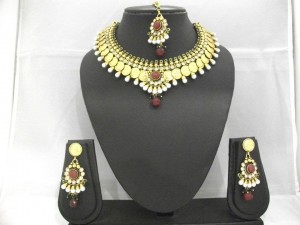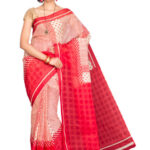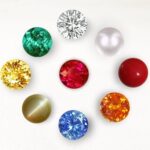Voh moh! Some seriously heavy religious/spiritual stuff from N.R.I.pathi ( or should I say Swami Nripathinanda? 😉 ) past month.
I will switch us back to some fun today with my favorite topic (ok, my favorite topic after money 😉 ) jewelry.
My post is on the famous style of Andhra jewellery: Kasulaperu
Also known as Kasumala, Kasulaperu (pronounced: Kaasulaperu) is the biggest name in Andhra ornaments. While common to all four regions of South India, the Kasumala style has taken a distinctly Telugu name in Kasulaperu. They have very recently become trendy, and a number of model/actresses both South and North have been seen showcasing it at functions.
The name for this necklace comes from Lakshmi coins strung together, which is very auspicious. In fact, it is so valued that it is the preferred gift to brides at Wedding. However, it is popular enough that it is a favorite for all, from little girls to elderly ladies. In fact that, the length of it is often used to indicate age.
It is considered to be very royal, and in fact, in the coin itself, both Goddess Lakshmi and Lord Venkateshwara are seen wearing Kasulaperu in each image.
By wearing it, it gives a certain dignity and sense of adornment to the neck. It communicates a feeling as if Lakshmi Devi herself is residing with you.
The beauty of this piece is, like the Venkatagiri saree, it is dignified yet trendy. Many top actresses of yesterday and today can be seen showcasing it at major functions.
[UPDATED]
History
Kasulaperu is an indigenous style of jewelry. Historians trace it back to the Andhra Ikshvaku dynasty of Bhattiprolu (Pratipalapura). The Nishka gold coin necklace which has been traced back to as far back as the Vedic period had become popular in Andhra. Kasulaperu, is thus, seen as a descendant. Versions of it can be seen even today in sculptures from Amaravati. The name Kasulaperu is itself traced to the Sanskrit word Karsapana, which was the ancient Indian currency and name for coin.
Styles
 There are a number of different styles of kasulaperu. In fact, a number of modern designs have also sprung up in recent years.
There are a number of different styles of kasulaperu. In fact, a number of modern designs have also sprung up in recent years.
Lakshmi Kasulaperu
This is the traditional gold coin necklace featuring an image of Lakshmi Devi. It is the standard gift to brides at weddings. The size of each Kasu is very large due the grandness of the occasion and the ancient style of the jewelry. Prices can reach even ₹1,80,000.
Designer Kasulaperu
Liberalization has changed many tastes over the years, and new/modern styles of Kasulaperu have emerged. The first of these is generally called “Designer” Kasulaperu. It is notable for its smaller coins and for the lining of small gold balls to adorn the adornment itself. It works best with a pattu cheera (sari).
Stone Kasulaperu
One of the trendier styles of the ornament. It takes its name from the precious or semi-precious stones that line the necklace to complement the coins.
Kasulaperu with Pendant
One of the more eye-catching varieties, this style has broken the previous pendant-less mold of the necklace. The dangling pendant will frequently feature not only precious and semi-precious stones, but even enamel work. The variety itself began when jewelers began adding lockets to the necklace.
Necklace Kasulaperu
While the name is seemingly redundant, this term is used to emphasize the tighter fit of the style, in contrast with the traditional lengthier varieties. This version, seen above, is seen as more modern and elegant. It is undoubtedly an ideal fit for the globe-trotting, elegant Andhra woman.
Antique Kasulaperu
Taking inspiration from the more ancient varities, this version is true to its name and is decorated with kundan (gem set with gold foil on mount) and stones. It is typically featured with a three string fuse pattern. Due to the intricate nature of the work, prices can reach as high as ₹7 lakhs.
Double Layer Antique Kasulaperu
This is the latest variety of the ornament. It features a bottom layer of large coins that are anointed at the top with smaller coins, imprinted with images of Goddess Lakshmi. It also features the antique work emblematic of the previous style, giving the best of both ages.
In conclusion, it is a piece of jewelry that is fashionable in every era. It is frequently called:
The Queen of Jewelry.
What diamonds are to regular stones is what Kasulaperu is to regular ornaments!
References
- Murthy, Krishna K. Nāgārjunakoṇḍā: A Cultural Study. Delhi: Concept Publ.Co.1977
- http://www.info-bee.com/2012/07/kasu-mala-designs-kasumala-designs.html









